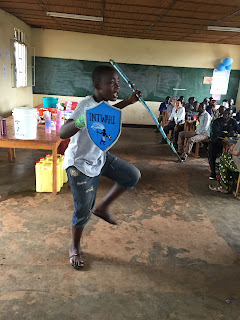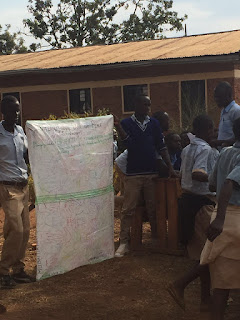As I sit on my couch with my kitten on my lap and my dog
snuggled up next to me, I listen to the sounds of rainy season; the gusts of
wind, the rain sliding sideways across my roof, and the splashing of my
overflowing water tank. Many of you know, or maybe you don’t, that we are on a
break from school for the 23rd Commemoration of the 1994 Genocide
Against the Tutsi in Rwanda. Over the last few days I have been reflecting on
the ideas of reconciliation and forgiveness. Are they synonymous? Is one part
of the other? Can you have one without the other? These thoughts brought me to
what many people refer to as the 5 Stages of Grief, and how they have played
out in Rwanda. As you read this, please know that I am not trying to
rationalize anything, I am not judging anyone’s experiences, and I am most
certainly not trying to say that I understand and know what it was like to
experience such trauma as the Genocide; these are simply my thoughts and my
personal reflection on what I have seen and experienced while participating in
the Commemoration Events.
1. Denial: When the 1994 Genocide Against the Tutsi started,
the international community sat motionless in awe of the atrocities that were
being committed in Rwanda. They denied the severity of the situation for years
prior to the Genocide and they made a conscious decision not to intervene while
the people of Rwanda were being slaughtered by their friends, their neighbors,
even their own family members. They denied the killings and even now some deny
the pain that was, and still is in some respects, being experienced. So many
stories from survivors start with a statement like “I couldn’t believe what was
happening; it was like the world stopped moving and everything was frozen”.
What happened in Rwanda was unbelievable.. Unconscionable. How could such evil
exist? Denying what happened here is wrong, it was wrong. When you look at the
slowly healing scars, which are often hidden from an unknowing foreigner, it is
impossible to deny the atrocities that so many people bore witness to in 1994.
2. Anger: Human Rights groups, foreigners who had refused to
abandon their neighbors and friends, and the citizens of Rwanda were and are
still outraged by the denial of the international community. Understandably. I
personally cannot understand how the UN and the Security Council were able to
allow the 1994 Genocide Against the Tutsi to occur. It wouldn’t have been
difficult to prevent the Genocide from occurring. Rwanda is a small country and
they were using low-tech equipment to carry out the killings. This wasn’t a
nuclear threat to the world. The Interahamwe or the Habyarimana regime could
not have retaliated against countries involved in a Peacekeeping Mission; they
simply did not have the capacity to do so. So why did the international
community sit by and watch this horror story unfold? On the grassroots level
there were millions of people who are angry with the perpetrators for the
crimes that they committed. The family members that they killed. The homes that
they pillaged. The destruction that they caused.
3. Bargaining: With a country left with so much pain, so
much rage, the new government was handed the struggle for finding a way to help
the country move forward. A mighty challenge this was indeed with some groups
calling for retribution killings, others calling for all perpetrators to be imprisoned,
and an even larger population of traumatized people trying to find lost loved
ones and carry on with their lives.
4. Depression: I can only imagine the state of Rwanda after
it was liberated by the RPF. The sense of relief accompanied by an overwhelming
silence. People trying to understand what had just happened; trying to find
missing parents, missing children, missing families. Quietly and silently
grieving for the people that were killed, the people that were lost and still
yet to be recovered, and the people who were displaced trying to find their way
to a home, not knowing what will await them when they reach there. Just an eerie
quietness accompanied by heavy air. A deep depression which is still felt every
year around this time, causing time to seemingly stop and wait for those who
are mourning.
5. Acceptance: Acceptance is something that I have never
quite understood. Yes, you accept the reality of the past and the present, but
can you really accept what has happened as being ok? I think in this context acceptance
is more of knowing what happened, how it is still affecting you, and accepting
that this cannot change. The Rwandese will never forget what happened here in
1994. There will be many generations to come who still experience
transgenerational trauma. No one can change that. That is out of our control.
However, we can move forward alongside each other working towards peace. Peace
is a process. It requires dedication. It requires motivation. It requires reconciliation
and effort to move forward. And, eventually, it requires a sense of true
forgiveness on a collective scale. Something that I do not believe to be
possible just yet.
During Commemoration there is a lot of talk about
reconciliation and forgiveness, which I have come to see as an extension of
these so-called “5 Stages”. But what are reconciliation and forgiveness,
really? How can you define something that is done differently and on a
different timeline for every person?
Many times reconciliation is discussed as something that
goes hand-in-hand with forgiveness; you can’t have one without the other. From
what I have seen and experienced, I don’t think this is necessarily true. I
think reconciliation among people is the act of being able to live and work
together, knowing the past, but sharing a common desire to move forward and
continue living. In Rwanda people live together; sometimes as neighbors with
the person/people who are responsible for the disappearances or deaths of their
families. When Rwandans decide to talk to you about the process of reconciliation,
many people say that it is out of a necessity to continue living and recover
from the past. One woman explained it as follows: “We live together because we
have to. We rely on our neighbors for help. If my child is sick and needs to go
to the hospital, who am I going to call? We need each other to continue living
despite what harm they may have caused me during the Genocide”. Reconciliation
is a necessity. The country and culture cannot be rebuilt unless all people are
working together to achieve the same goal. This is something that has been done
in Rwanda in a unique and respectable way. When you walk around in different
places of the country you can see the scars, but somehow people are moving
forward. They are living.
Forgiveness, however, takes it a step further. I believe
that true forgiveness is the most difficult thing a person can ever do; something
that is rarely accomplished. For those who have truly and fully forgiven the
people who damaged them both physically and emotionally, the people who killed
their families, you are strong. I think it is rare to find true forgiveness in
the first or even the second generation of people who have experienced an
atrocity like genocide. It is a trauma that cannot easily be healed or
forgotten. I do believe that collective forgiveness will be accomplished here
in Rwanda. Definitely not today or tomorrow, but as the years pass it will
happen as a result of the common dedication to move forward and make sure that
history will not repeat itself.



























